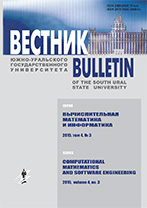|
This article is cited in 2 scientific papers (total in 2 papers)
Computer Science, Engineering and Control
Methods and tools for organizing the global job queue in the geographically distributed computing system
A. V. Baranov, A. I. Tikhomirov
Joint Supercomputer Center of the Russian Academy of Sciences - Branch of Federal State Institution «Scientific Research Institute for System Analysis of the Russian Academy of Sciences», (pr. Leninsky 32a, Moscow, 119334 Russia)
Abstract:
The geographically distributed computing infrastructure (DCI) considered in the paper includes high performance computing systems united by communication channels. Computing systems from the DCI are high-performance clusters differing in architecture and performance. Communication channels uniting clusters have different reliability and bandwidth. The considered model of DCI has a decentralized jobs management and dispatching scheme. This scheme implies that at any time malfunction of any computing cluster or a failure in the communication channel can cause cluster’s leaving the DCI. Cluster’s or channel’s troubleshooting means dynamically connecting the cluster to the DCI. The global job queue is organized in this computing infrastructure. Computing jobs have absolute priorities, and high priority job can interrupt low priority running jobs. Jobs from the global queue allocate on idle resources of computing systems. Forming and storing global job queue in conditions of dynamically changing DCI composition needs the reliable information system. The authors reviewed some distributed DBMSs as the basis of this information system. The article outlines the requirements for a distributed information system. The authors conducted a comparative analysis and selected a solution that satisfies the requirements, and designed prototype of the geographically distributed computing infrastructure with the decentralized scheme of jobs dispatching.
Keywords:
grid, information system, absolute priorities.
Received: 01.09.2017
Citation:
A. V. Baranov, A. I. Tikhomirov, “Methods and tools for organizing the global job queue in the geographically distributed computing system”, Vestn. YuUrGU. Ser. Vych. Matem. Inform., 6:4 (2017), 28–42
Linking options:
https://www.mathnet.ru/eng/vyurv176 https://www.mathnet.ru/eng/vyurv/v6/i4/p28
|

| Statistics & downloads: |
| Abstract page: | 168 | | Full-text PDF : | 89 | | References: | 25 |
|




 Contact us:
Contact us: Terms of Use
Terms of Use
 Registration to the website
Registration to the website Logotypes
Logotypes








 Citation in format
Citation in format 
